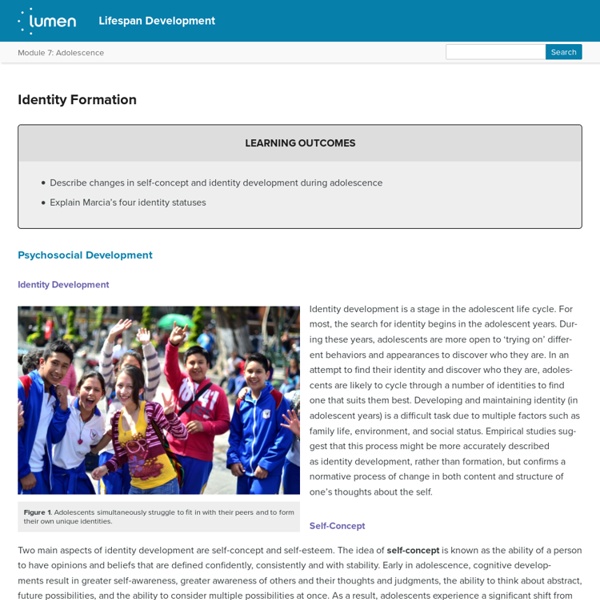Supportive parenting and teenagers - ReachOut Parents
Despite wanting to be a supportive parent to your child, you may feel like you’ve just had the door closed in your face and you’ve got it all wrong. Your relationship will be changing and starting to become more equal as they grow up and you spend more time apart. This doesn’t mean you can’t stay connected and provide the support they need as they go through this process of becoming a whole new person, an adult. This can help if you:
The Importance of Identity Development, Principled Moral Reasoning, and Empathy as Predictors of Openness to Diversity in Emerging Adults
There are many paths to enlightenment. —Lao Tzu, Chinese Taoist philosopher (600-531 BC) Long-studied in social psychology, the dangers of prejudice (Allport, 1954) and the importance of developing tolerance and respect for others have received attention with an increased sense of urgency over the past decade. Globally, although distances are ever-shrinking and differing cultures must cooperate for survival, terrorist threats and genocidal wars are part of the daily news. Within the United States, although population projections suggest that racial and ethnic minorities will comprise one third of all Americans by 2015 (Wang et al., 2003) and almost half the population by the year 2030 (Cortes, 1991), conflicts among racial and ethnic groups are responsible for many hate crimes (Wang et al., 2003). Numerous institutions, from governmental agencies to educational systems, have noted the need for increasing tolerance.
Risk-taking and teenagers - ReachOut Parents
This can help if you: are wondering 'why do teenagers take risks?' think your child takes problematic or negative risks want to learn about positive risk-taking. Common risky behaviour in teenagers
Six Ways to Build Your Teen's Identity - Focus on the Family
Marriages and families are in trouble after the challenges of last year. If it's not too much to ask, would you help equip these families with the resources they need to put Jesus at the center of their home? Yes, I will help struggling families! Español
Adolescent Identity Development - Adolescence - ACT for Youth
The development of a strong and stable sense of self is widely considered to be one of the central tasks of adolescence [1]. Despite the fact that identity development occurs throughout one's lifetime, adolescence is the first time that individuals begin to think about how our identity may affect our lives [2]. During adolescence, we are much more self-conscious about our changing identities than at any other stage in our lives [3]. Visit Toolkit: Identity Development for resources. Learn more about Adolescent Development.
Family experience in facilitating adolescents during self-identity development in ex-localization in Indonesia
Identity achievement of adolescents living in ex-localization is similar to that of adolescents in general In this study, the families expressed that the identity achievements of their children in terms of changes were similar to the achievements of adolescents in general. These changes included physical, appearance, and behavioral changes, the ability to build relationships with members of the opposite sex, and the ability to choose activities based on their own interests. Brownlee [14] states that development in early adolescence is characterized by rapid physical changes including height, maturity of reproductive organs, secondary sex characteristics, increased muscle strength, and weight [15, 16].
Five Ways to Help Teens Feel Good about Themselves
No one wants to hang out with me. I’m a failure at school. All my other friends seem happy. What’s wrong with me?
Adolescent Identity Development: What to Expect in Teens
Adolescent Identity Development: The Factors of Change Among the profound and exciting changes taking place in adolescence is the process of self-discovery. Our teens are working to figure out who they are, making adolescent identity development a central feature of teen life. Young people’s identities are shaped by lots of factors — family, cultural and societal expectations, experiences with institutions like school and the media, and friends. Young people also take active steps and make choices that shape their identity.
Erik Erikson and Self-Identity - Child Development Theory: Adolescence (12-24)
According to Erik Erikson, a prominent developmental theorist of the 1950's, youth must resolve two life "crises" during adolescence. Unlike many other developmental theorists of his era, Erikson's psychosocial theory of human development covers the entire lifespan, including adulthood. Erikson used the term "crisis" to describe a series of internal conflicts that are linked to developmental stages. According to Erikson's theory, the way a person resolves the crisis will determine their personal identity and future development.



